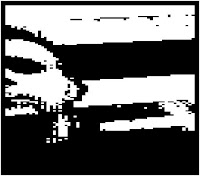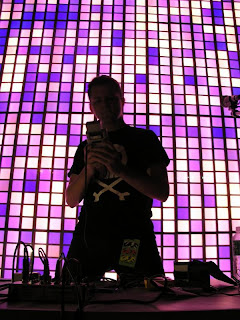Dot.AY interview with BitShifter
 Finally we are getting around to our third in a five part series of interviews performed by Australian chiptune artist Dot.AY. Check these links to read up on prior interviews with 8 Bit Weapon and Sm0hm. This time Dot.AY spends some time with famed chiptunist BitShifter. Read up and found out about more of what makes BitShifter tick.
Finally we are getting around to our third in a five part series of interviews performed by Australian chiptune artist Dot.AY. Check these links to read up on prior interviews with 8 Bit Weapon and Sm0hm. This time Dot.AY spends some time with famed chiptunist BitShifter. Read up and found out about more of what makes BitShifter tick.
1. What equipment do you use to create your music?
-Does this differ between live and composing context?
I'm using the first generation Nintendo Game Boy (commonly called the "Classic" version), running one of two home-brew Game Boy musicmaking programs, either Nanoloop (developed by Oliver Wittchow) or Little Sound Dj (developed by Johan Kotlinski). The setup is basically the same during both composition and performance, a Game Boy running either a Nanoloop or an LSDj cartridge. Although occasionally I'll use two Game Boys running Nanoloop in live performance, synchronized via a GameLink cable.
2. Can you outline your compositional process?
- Does the technology used affect this?
The composition process is usually pretty spontaneous, it's rare for me to pick up the Game Boy with a preconceived notion of what I want the end result to be, although that occasionally happens. The process usually involves a combination of deliberate composition and exploration / exploitation of happy accidents -- for instance, entering a short melody or sequence of sounds, and then altering sound parameters to introduce an element of chance, changing the sound & behaviour of the notes in ways that can have unpredictable results. So it's pretty exploratory, in a lot of ways it's like collaborating with the program and hardware, there's a bit of back-and-forth between the device and the operator. So in that sense, the creative process is influenced and mediated by the technology. The hardware and software present certain creative avenues, and steers the user this way or that way -- like any musicmaking environment or instrument will. The two different programs I'm using each promote a slightly different musicmaking approach too, at least in my experience. LSDj is note-based, utilizing traditional note designations (C, C-sharp, D, D-sharp, etc.), and I find that most of the tracks I do in that program end up being more melodic, pop tracks. Nanoloop's interface is abstract and almost entirely graphical, using no traditional reference points for sound or pitch parameters. In my experience this is really liberating, it sort of triggers a different way of conceptualising and approaching music creatively. This allows me to sidestep the traditional methods of approaching music that I've always been entrenched in, and makes the whole experience much more about exploring sound, rather than melody. So those tracks end up sounding more abstract, and based around texture and rhythm, rather than overt melody. Both programs are versatile enough to serve in both roles (melodic vs. abstract), but as a musician it's been really interesting to see how the programs' different conceptual models lead to different creative results.
3. Do you post-produce, mix and master your own recordings?
I do, to the extent that I have any real qualifications to use any of those terms. So far I'm doing very little by way of post-production -- no outboard mixing (all adjustments of the individual channel levels are done within the Game Boy as part of the composition process), and my "mastering technique" is pretty amateurish and heavy-handed. But yes, I'm doing all of that myself.
 4. What is your musical and technical background?
4. What is your musical and technical background?
-Please include what music other than chiptunes, if any, you have been involved in?
It's mostly characterized by total pursuit of impulse and total disregard for discipline or practice. I took a few years of piano lessons when I was young, but that didn't last long. I picked up guitar in high school, mainly learning the instrument by playing along to various Beatles and hair-metal albums. I've been involved in a bunch of bands ever since, mostly in an ostensibly noisy, punky, melodic vein. I was a pretty avid hometaper / cassette four-tracker for a long time, which is a bit of a conceptual parallel to the Game Boy project in that I discovered that creatively, I work best when working under technical constraints and limitations.
5. Why do you think you compose chiptunes instead of some other form of music?
- Do you feel particular loyalty to the chiptune community?
I do feel a loyalty to the community, but making chiptunes has never been to the exclusion of also making other kinds of music. I still work with other types of music, so it's never really been a matter of exclusively choosing to make one type of music over another.
6. Do you feel there is a 'generation gap' between the demo/mod scene and new artists who don't program/hack?
- If you agree, what does this mean for the future of the scene?
It's a good question, but speaking as someone who was only distantly aware of the demoscene, and who has never done any hardware hacking, I don't really feel any particular gap. I definitely respect demosceners and hardware hackers though and secretly wish I could command that kind of cred.
7. Do you compose with the gameboy portably in public/irregular surroundings?
-How do you find surroundings effect composition?
I definitely make use of the Game Boy's portability. I do a lot of composing on subways, airplanes, park benches, toilets, and so on. The surroundings never really affect the process though -- it's a really immersive and inconspicuous activity, so I basically get absorbed in what I'm doing and my awareness of my surroundings is limited to just trying not to miss my subway stop.
8. What in your opinion makes a good chiptune?
I couldn't really say. I'm constantly amazed by the breadth of styles and the new ideas I hear in peoples' tracks, stuff that you could never predict and even if you could, you probably wouldn't think it would be a viable idea. So I couldn't cite anything specific. If anything, I'd say I really respond to anything that's fully-realized in terms of concept or artistic convictions. So one of Bud Melvin's left-field Game-Boy-and-banjo tracks, or one of Overthruster's evolving, generative pieces, or Trash Can Man's meticulous powerpop masterpieces -- the only real common attribute being that there's basically an obvious single-minded purpose at work, which comes through in the final product.
About the Artist: Bit Shifter aka Joshua Davis is a powerhouse in the Chiptune scene. His Gameboy music is hard frenetic and incredibly dance friendly as is his live show. Having performed over one hundred shows all over the world, being involved in large netlabel 8bitpeoples.com and having his name on many high quality chiptune releases it is no wonder he is a well-known legend within this genre.
This interview was performed by Alex Yabsley (Dot.AY) on 04/27/2007.
(live photo credit: Jamie Bruno)